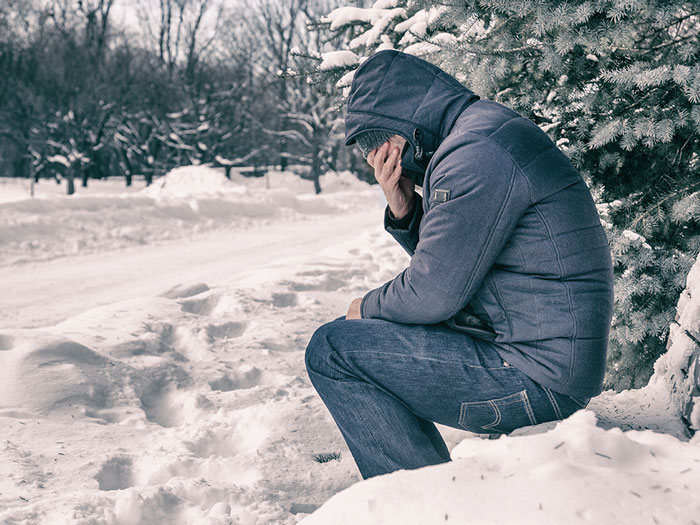As we keep marching through the lull between the holiday season and spring time, dreary winter weather can have more of an effect on our health than we might realize.
If you are suffering from addiction or are actively in recovery, the weather can create triggers to use. It’s important to be aware of how the seasons affect your mood and to see a doctor or psychiatrist if your physical, emotional, and mental health begin to suffer during a particular season.
What is Seasonal Affective Disorder (SAD)?
According to the National Mental Health Institute (NIMH), SAD is a mental illness that is found only in cases where it would be in addition to a pre-existing diagnosis of major depression. In addition to NIMH, WebMD explains that SAD would be diagnosed when all of its symptoms are met for two years or more during a specific season (for the majority of people that season is winter) and then gets better once the season passes. WebMD suggests that your physician conduct a blood test to rule out other conditions with similar symptoms, and to conduct a mental health exam before diagnosing SAD.
Both sources concluded that the exact causes of SAD are still unknown, but NIMH did identify some recent research that shed some light on possible biological explanations that are in response to a lack of sunlight. One is that during the winter months people who have SAD can overproduce the mood-altering serotonin transporter protein and the hormone melatonin that regulates sleep. They explain that “higher serotonin transporter protein leaves less serotonin available at the synapse;” additionally, people with SAD might have a vitamin D insufficiency that also affects our serotonin production. The increase in melatonin could be their bodies’ response to the winter’s shortened days, but that increase can leave people feeling lethargic and with off-balance circadian rhythms.
What Are Symptoms of SAD (NIMH)?
Since SAD would be diagnosed in addition to major depression and therefore they share many symptoms, I’ll first list those symptoms. Then I’ll list the symptoms specific to winter SAD (usually during September-May) and summer SAD.
Symptoms of Major Depression:
- Chronic feelings of depression, hopelessness, worthlessness, apathy, agitation, and inability to concentrate easily
- Sleep difficulties or abnormalities, feelings of sluggishness and low energy
- Changes in appetite, weight
- Thoughts of self-harm, death, and/or suicide
Symptoms Specific to Winter SAD:
- Oversleeping and low energy
- “Hibernation tendencies” like social withdrawal, oversleeping and low energy, and overeating–especially cravings for carbohydrates–and weight gain
Symptoms Specific to Summer SAD:
- Feelings of agitation, restlessness, anxiety, and violent actions
- Lack of appetite, weight loss, and insomnia
Who Can Have SAD (NIMH)?
Again, SAD is still a topic that is in want of research, but there are a few points that sources agree upon:
- Gender: “SAD is diagnosed four times more often in women than men” (NIMH).
- Age: Younger people are more at risk than older, even teens and children.
- Other mental illnesses: It co-occurs with major depression and bipolar disorder.
- Distance from the equator: The further you are from the equator the more likely you are to be diagnosed with SAD, which is consistent with the research pointing to the biological effects of a lack of sunlight.
- Family history: If you have close relatives with SAD, you are more likely to also have SAD.
Can SAD Be Treated?
Thankfully, just like all other mental illness (e.g., addiction), SAD can be treated! Specific to SAD, there are two avenues of treatment approaches to take. First, take medication that will address the chemical imbalances and vitamin D insufficiency. Second, get one of the two following of therapy. A person diagnosed with SAD can greatly benefit from psychotherapy, or talk therapy, as can anyone who suffers from mental illness. More specifically to SAD, light therapy can simulate sunlight and help with some of the biological factors. All of these treatment approaches and options can be combined or used separately, and should be tailored specifically to your situation and state of health.
More importantly, if you are in recovery and feeling triggered by SAD symptoms, talk to your doctor and to your sponsor or therapist about how to avoid a slip-up or relapse during the season.










